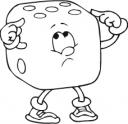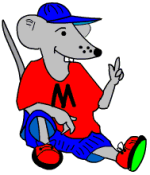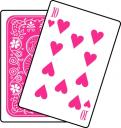Thirteen UK centres offering controversial treatment for people with dyslexia have been shut down due to financial difficulties. Originally set up by millionaire Wynford Dore the centres were not cheap – £1500 for a 12 month programme.
Dyslexia is a condition which affects the ability to process language and in some cases also mathematics.
Many people see a link between dyslexia and discalculia although there has been little research on the latter.
 Here is a very simple game for two players aimed at re-inforcing the term ‘one less than’ with numbers up to 6. This is aimed at children just getting ready to go to school or those who are in the Foundation Stage. It is a page from an exciting new venture called ‘You Are Brainy’ which will be launching at the end of the summer and they have kindly allowed me to put up one or two of their resources.
Here is a very simple game for two players aimed at re-inforcing the term ‘one less than’ with numbers up to 6. This is aimed at children just getting ready to go to school or those who are in the Foundation Stage. It is a page from an exciting new venture called ‘You Are Brainy’ which will be launching at the end of the summer and they have kindly allowed me to put up one or two of their resources. Writing large numbers in words is not easy but by the end of year 5 many children will be confident enough to read numbers in the millions. In the past, in the UK, a billion has been considered as a million million, but in the USA a thousand million has been thought of as a billion. This seems to be the norm in the UK these days as well so Neptune at 4 500 000 000 km from the sun can be said as “
Writing large numbers in words is not easy but by the end of year 5 many children will be confident enough to read numbers in the millions. In the past, in the UK, a billion has been considered as a million million, but in the USA a thousand million has been thought of as a billion. This seems to be the norm in the UK these days as well so Neptune at 4 500 000 000 km from the sun can be said as “ It’s a while since I sent anything up for children in year 3 and for shape so here is a worksheet just for them!
It’s a while since I sent anything up for children in year 3 and for shape so here is a worksheet just for them! Here’s a nice little investigation for young children. Take two differently coloured dice and work out how many different ways that 6 can be scored when they are both rolled.
Here’s a nice little investigation for young children. Take two differently coloured dice and work out how many different ways that 6 can be scored when they are both rolled. A pack of cards is a great resource for helping with maths at home. Here is a simple game that can help to develop the concepts of more and less.
A pack of cards is a great resource for helping with maths at home. Here is a simple game that can help to develop the concepts of more and less. Good luck to you all with the SATs this week. I’m sure that if you have had a little practice on some of our worksheets you will find the maths OK. Remember, the results do not really mean a lot – there are many children out there who got a level 3 at 11 who have now got excellent University degrees!!
Good luck to you all with the SATs this week. I’m sure that if you have had a little practice on some of our worksheets you will find the maths OK. Remember, the results do not really mean a lot – there are many children out there who got a level 3 at 11 who have now got excellent University degrees!!